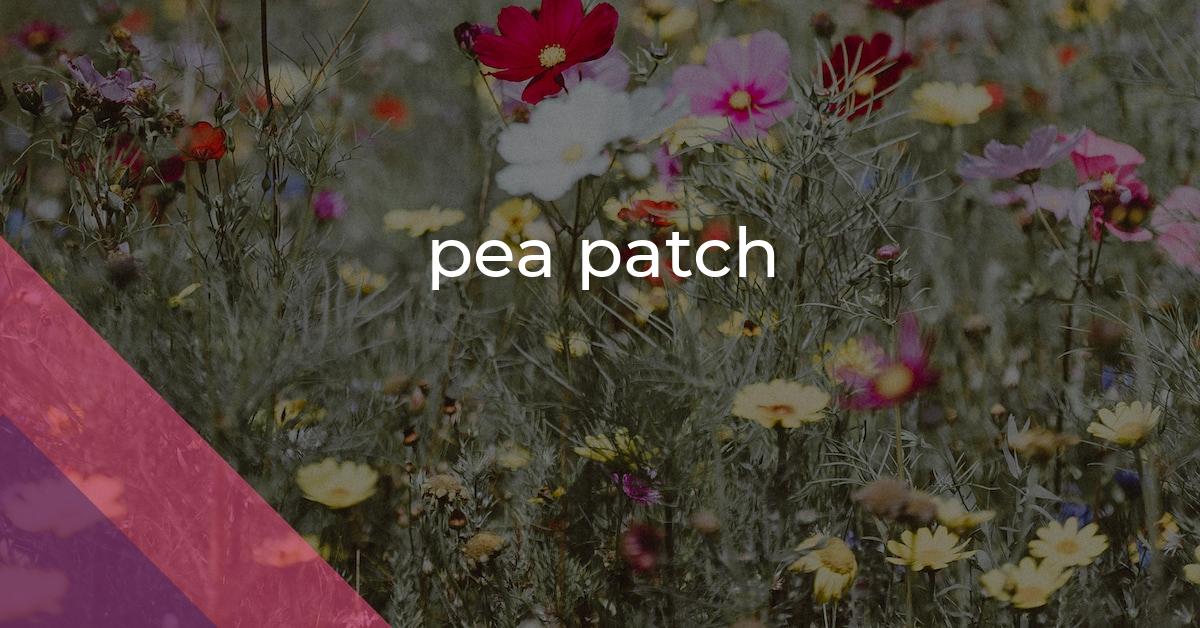pea patch: Idiom Meaning and Origin
What does ‘pea patch’ mean?
The idiom "pea patch" refers to a place where one feels a sense of comfort and contentment. It symbolizes a peaceful and enjoyable environment.

Idiom Explorer
The idiom "tear up the pea patch" means to cause a disturbance or create trouble. It originated from the 19th century where "pea patch" referred to a garden or cultivated area. "Tear up" signifies the act of damaging or disrupting. The idiom is typically used to describe someone who is causing chaos or wreaking havoc.
The idiom *rough patch* refers to a difficult or challenging period of time in someone's life or a situation. It implies that things are not going well and there are obstacles or problems to overcome.
The idiom "rose garden" metaphorically refers to a situation or place that appears pleasant and peaceful, but is, in reality, filled with hidden dangers or difficulties.
The idiom "roof over one's head" means having a place to live or having shelter. It emphasizes the basic necessity of having a roof to protect oneself from the elements.
The idiom "rest easy" means to feel calm, relaxed, and free from worry or anxiety. It implies a sense of trust or confidence that everything is under control and there is no immediate cause for concern.
The idiom "proud as a peacock" means feeling a deep sense of self-importance or satisfaction about oneself or one's achievements. It is often used to describe someone who is excessively proud, arrogant, or boastful.
The idiom "pretty pictures" refers to visually appealing and attractive images or photographs. It is often used to describe something that looks nice or pleasing to the eye but lacks substance or depth.
The idiom "peaches and cream" refers to something that appears to be perfect, flawless, or ideal.
The idiom "patch up" means to repair or fix something, often referring to relationships or conflicts that need resolving. It implies resolving issues by finding a solution or compromising to restore harmony.
Unveiling Pea Patch's Origin
The idiom "pea patch" has several meanings, all of which convey notions of escape, retreat, and a return to simplicity. Its origin can be traced back to the early 19th century, but the exact details are unclear. One of the most widely recognized meanings of the idiom relates to seeking solace or refuge in a peaceful environment, often away from the hustle and bustle of urban life. In this context, the term "pea patch" is used metaphorically to represent an idyllic garden or a tranquil countryside setting.
Imagine yourself in your happy place, surrounded by rows of lush green pea plants swaying gently in the breeze. A pea patch, or a peaceful lush garden, provides a sense of tranquility and a break from the busyness of everyday life. It is a place where you can escape, recharge, and find inner peace. Just as a pea patch offers solace to those seeking respite, finding our own happy place, whether it's a physical location or a state of mind, is essential for our well-being.
Another interpretation of the idiom refers to a state of contentment and satisfaction, often achieved by tending to one's own personal matters, free from external distractions. This usage implies a focus on one's own well-being and the pursuit of simple pleasures. Picture yourself sitting in the shade of a peach tree, enjoying a bowl of fresh, juicy peaches and cream. This sweet moment represents a metaphorical "pea patch" where you can savor life's simple joys, nourish your soul, and find contentment in the present moment.
Furthermore, the idiom can also be used to describe a situation where one indulges in an activity or pursuit purely for personal enjoyment, without any regard for its practical or productive value. It implies a sense of carefree abandon and a deliberate choice to prioritize leisure over productivity. Think of your home sweet home, the place where you can freely engage in hobbies, spend time with loved ones, and pursue activities that bring you joy. Just like tending to a pea patch, these leisurely pursuits contribute to your overall well-being and help you find balance and fulfillment in life.
While your home is your primary sanctuary, there are occasions when you find comfort and familiarity in another setting. Whether it's a vacation rental, a friend's place, or a cozy cabin in the woods, these temporary abodes offer a home away from home. They provide a sense of belonging, security, and relaxation, creating an environment where you can truly be yourself. Similar to finding solace in a pea patch, these temporary homes allow you to escape the demands of daily life and rejuvenate in a familiar and comforting space.
Lastly, the idiom "pea patch" can also be related to the concept of being at peace. In the midst of chaos and uncertainty, seeking peace becomes a priority. Picture yourself sitting in a peaceful garden, listening to the gentle rustle of leaves and feeling a sense of calm wash over you. This tranquil moment represents the essence of being at peace, where you can let go of worries, find inner harmony, and embrace a sense of serenity. Just as tending to a pea patch requires care and nurturing, finding peace in our lives requires intentional effort and a commitment to self-care.
While the precise origin of the idiom remains uncertain, it is clear that "pea patch" has become deeply ingrained in the American lexicon. It reflects a longing for simplicity, a desire to detach from the complexities of modern life, and an appreciation for the tranquility and contentment that can be found in nature. Through its various interpretations, the idiom encourages individuals to prioritize their well-being and find solace in the pursuit of personal pleasures. "Pea patch" serves as a reminder to indulge in moments of tranquility and embrace the joy that can be found in the ordinary aspects of life.
Example usage
Examples of how the idiom *pea patch* can be used in a sentence:
- She planted her favorite flowers in the pea patch.
- After a long day of work, he enjoys relaxing in his pea patch.
- The children played in the pea patch while their parents harvested vegetables.
The idiom *pea patch* is commonly used to refer to a small garden or plot where peas are grown. It can also be used metaphorically to represent a peaceful or tranquil place. The examples above demonstrate how this idiom can be used in different contexts to describe gardens, relaxation, and children playing. Overall, the idiom conveys a sense of contentment and enjoyment of nature.
More "Agriculture" idioms



